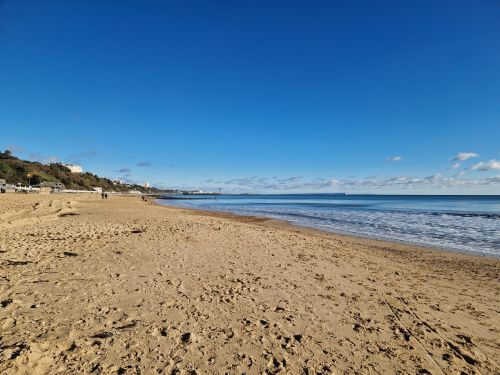“Can I study in Bournemouth in February? It’s much cheaper.”
You can. But you probably shouldn’t.
Bournemouth is fundamentally a beach town. Seven miles of golden sand, coastal walks, water sports, outdoor cafés, beach volleyball. That’s the entire point. Take away the beach weather, and you’re left with a pleasant but fairly quiet town where half the attractions are closed and the main draw is unusable.
Here’s why summer is the only time Bournemouth makes sense, and why the premium prices are actually worth paying.
Let’s be clear about what you’re choosing. Bournemouth isn’t London. It doesn’t have world-class museums you can visit in the rain. It doesn’t have a massive tube network connecting you to endless indoor activities. It’s not a big city where life continues regardless of weather.
It’s a coastal town built around beach life. The language schools here know this – their summer programmes include beach activities, surfing lessons, paddleboarding, coastal walks. They’re not just teaching you English in classrooms; they’re teaching you English while you’re actually doing things outside.
In winter, those programmes don’t exist because the beach is windswept and mostly empty (except dog walkers and cold water swimmers), most water sports operators have closed for the season, and nobody’s having lessons on a beach when it’s 5°C and raining sideways.
One Spanish student told us: “I chose Bournemouth because I wanted to improve my English at the beach. Then I came in March to save money. The beach was freezing. I should have just gone to London.”
When Bournemouth Comes Alive:
June through August, Bournemouth transforms completely.
The beach is actually usable. British people consider 18°C warm enough for beach life (international students usually prefer 20°C+, which happens regularly July-August). Beach volleyball games run constantly, paddleboarders everywhere, people swimming, outdoor yoga classes.
The pier buzzes. The gardens are gorgeous. The coastal path to Boscombe is brilliant for runs or evening walks. Every restaurant has outdoor seating. There’s a genuine holiday atmosphere.
Your language school classes mix with outdoor activities. Morning lessons, afternoon at the beach practising English with classmates from around the world. Evening barbecues. Weekend coastal trips. You’re learning while experiencing exactly what Bournemouth is meant to be.
The student population swells considerably, creating a vibrant international community. You’ll make friends from everywhere.
We had a Korean student in July: “Every evening, different beach activities. Volleyball, barbecues, watching the sunset. I made friends from 12 different countries. My English improved because we spoke English all the time.”
Yes, It’s Expensive. Here’s What You’re Paying For
Let’s talk honestly about costs. Accommodation and course fees jump considerably in summer.
But you’re paying for the beach town experience that only exists in summer. Trying to save money by coming in winter is like buying tickets to a cancelled concert.
You’re paying for language programmes specifically designed around the location – beach activities, outdoor lessons, social programmes. Winter courses are just classroom learning, like anywhere else.
You’re paying for the international student community and constant English practice outside class. And you’re paying for facilities that are actually open and operating properly.
One Italian student initially complained about July prices. Two weeks in: “I get it now. This wouldn’t exist in February. I’m paying for summer Bournemouth, not just any Bournemouth.”
Who Shouldn’t Choose Bournemouth
Be honest: if your budget is genuinely tight, summer Bournemouth’s premium pricing might stress you out. London or northern cities offer better value.
If you want museums, galleries, theatre, diverse restaurants – London has infinitely more. Bournemouth’s appeal is specifically beach life.
If you’re coming outside June-August, there’s no real advantage to Bournemouth over other UK destinations. And if you’re not actually bothered about beach activities, you’re paying a premium for something you won’t use.
The Shoulder Seasons: May and September
May can be lovely – temperatures reaching 15-18°C, many attractions open, accommodation cheaper than peak summer. But British May weather is unpredictable. You might get beautiful days or persistent rain where beach life doesn’t work.
September is more reliable – water is warmest, weather often stays pleasant through mid-month, prices have dropped from August. The town’s still in summer mode but without the crowds.
Both work if you’re comfortable gambling on weather.
What About Brighton?
Quick note on Brighton since people often compare them.
Brighton is different because it’s not purely a beach town – it’s a creative, quirky city that happens to have a beach. Theatre scene, vintage shopping, indie music venues, café culture. These continue year-round.
Brighton’s shoulder seasons (April-May, September-October) work better than Bournemouth’s because the city itself has appeal beyond the beach. But summer is still when Brighton’s best.
Bournemouth is more beach-focused. The town’s appeal relies more heavily on coastal activities working properly.
Making the Decision
If you’re genuinely excited about beach life and English learning combined, summer Bournemouth offers something special. Morning classes, afternoons at the beach, evenings with international friends, weekends exploring the Dorset coast.
Yes, you’ll pay premium prices. But you’re paying for the complete experience when everything’s open, the weather makes outdoor activities possible, and the international community creates that summer energy.
If you’re primarily focused on English improvement and the beach is just a bonus, London or other cities offer better value year-round.
Thinking about winter Bournemouth to save money? Ask yourself: why specifically Bournemouth in February? What does it offer that London, Manchester, or Brighton don’t offer better?
Questions About Bournemouth or Other UK Study Locations?
We can help you decide whether summer Bournemouth fits your goals and budget, or whether another destination makes more sense.
Email us at info@londonhomestays.com and tell us:
- What matters most to you (beach life, cultural activities, budget)
- How long you’re planning to study
- When you’re available to travel
We’ll give you honest advice on where and when makes sense for your specific situation.
Previous: When to Study English in London: Why Winter Might Be Your Best Bet







